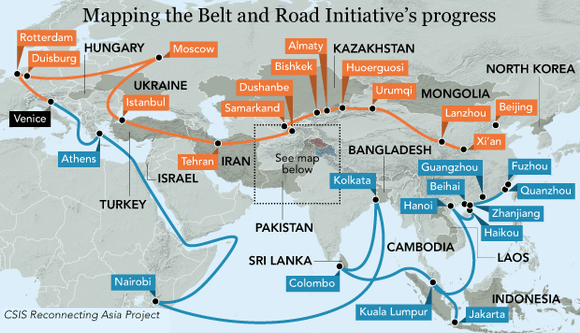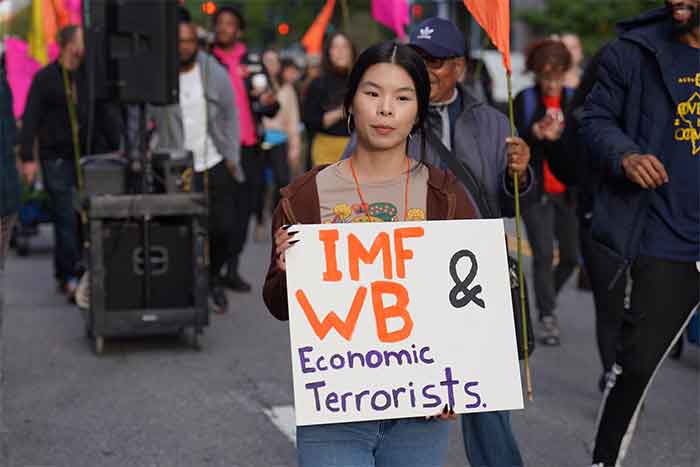
A business bad in standard of business has been done, and the business involves the World Bank (WB) and China.
Media reports said:
Some investors and campaigners expressed dismay on September 17, 2021 at revelations that the WB leaders pressured staff to boost China’s score in an influential report that ranks countries on how easy it is to do business there.
They also said the WB’s subsequent discontinuation of the “Doing Business” series of annual reports could make it harder for investors to assess where to put their money.
“The more I think about this, the worse it looks,” said Tim Ash at BlueBay Asset Management, adding that the reports published since 2003 had become important for banks and businesses around the world.
“Any quantitative model of country risk has built this into ratings. Money and investments are allocated on the back of this series.”
Manipulation
An investigation by law firm WilmerHale (https://www.reuters.com/business/sustainable-business/world-bank-kills-business-climate-report-after-ethics-probe-cites-undue-pressure-2021-09-16), at the request of the WB’s ethics committee, found that WB chiefs including Kristalina Georgieva, now head of the International Monetary Fund (IMF), had applied “undue pressure” to boost China’s scores in the “Doing Business 2018″ report.
WilmerHale concluded that staff members fudged the data to make China look better under pressure from Georgieva, then the CEO of the WB, and the office of Jim Yong Kim, then the WB’s president.
At the time, the Washington-based multilateral lender was seeking China’s support for a big capital increase.
WilmerHale delivered another blow to the WB and the “Doing Business” rankings. The WB staffers who were compiling the 2018 report were preparing to knock China down to No. 85 in the rankings from No. 78 the year before. The downgrade would have come at a time when the WB was trying to raise capital — an effort in which Beijing, the bank’s No. 3 shareholder, was expected to play a “key role,’’ according to the law firm’s report.
The investigation found that Georgieva “became directly involved in efforts to improve China’s ranking.'”
According to the investigation, she also lambasted the bank’s China director for “mismanaging” the bank’s relations with Beijing and for failing to appreciate how important the “Doing Business” rankings were to the Chinese leadership. Under pressure from the top, the investigators found, the bank staff decided to give China more credit for a new law involving so-called secured transactions — typically, loans that involve collateral. The upshot was that China ended up back where it was the rankings — No. 78. Other changes affected the rankings of Azerbaijan, the United Arab Emirates (UAE) and Saudi Arabia.
WilmerHale concluded that bank staffers knew that the changes to the report were “inappropriate” but feared retaliation — including dismissal — if they expressed concern. The law firm referred to a “toxic culture” at the bank.
In a statement, Georgieva rejected the report: “I disagree fundamentally with the findings and interpretations of the Investigation of Data Irregularities as it relates to my role in the World Bank’s Doing Business report of 2018.”
Georgieva said she had briefed the IMF’s executive board.
Advocacy group Tax Justice Network welcomed the investigation by the ethics committee.
“The bigger question is how, if it is even possible, the Bank can eliminate the apparent corruption of the institution,” the British-based group’s CEO Alex Cobham said on Twitter.
Vulnerable to Manipulation
Economists said such reports by the WB and others were useful but had long been vulnerable to manipulation.
They said some governments, especially in emerging market countries who want to demonstrate progress and attract investment, could become obsessed with their position in the reports, which assess everything from ease of paying taxes to legal rights.
The UAE, 16th in the latest 2020 report, had targeted topping the ranking in 2021, while Russia surged up the rankings to 28th in 2020 from a dismal 120th in 2011. Russian President Vladimir Putin set a challenge for the country to break into the top 20 by the end of the last decade.
When asked to comment on the WB ditching the ratings, Kremlin spokesperson Dmitry Peskov said on September 17, 2021: “The task of improving the business climate is not linked to the existence of any ratings. Ratings are just a yardstick.”
Past research by the WB nonetheless suggested that foreign direct investment flows were higher for economies performing better in its reports.
Losing Credibility
Charles Robertson, chief economist at Renaissance Capital, said ease of doing business scores had been losing credibility for years. Some countries employ investment firms, including his own, and even former government leaders to advise them on how to improve their rankings.
“There have been wide divergences between some countries corruption ranking(s) and the ease of doing business scores, which implies that these were only face-value improvements rather than reflecting underlying economic change,” he said.
“As an economist, though, it would a real shame if we lose access to the underlying data. It is really interesting, for example, to know that it takes a company in Brazil 900 hours to process taxes, whereas for somewhere else it take only 70,” Robertson added.
Emerging markets-focused investment manager Ashmore Group engaged a third-party data provider that used the Doing Business findings as one of their sources, but ultimately relied upon its own research for investment decisions, said Gustavo Medeiros, Ashmore’s deputy head of research at the investment firm.
“When companies are looking to do foreign direct investment, the report is a useful roadmap to understand where the potential problems may be and then they can go and do the due diligence,” he added.
The Report Dropped
Under fire for allegations that it bowed to pressure from China and other governments, the WB has dropped a popular report that ranked countries by how welcoming they are to businesses.
The report is important to many companies and investors around the world: They use the WB’s “Doing Business” report to help decide where to invest money, open manufacturing plants or sell products.
Eager to attract investment, countries around the world, especially developing economies, have sought to improve their rankings in the WB’s report.
Sometimes, nations would pursue substantive policy changes — by, for example, making it easier for businesses to pay taxes, obtain loans or enforce contracts. Sometimes, they would take a more aggressive tack: Like pushy high schoolers cajoling a teacher for a higher grade, they would lobby the WB to provide a higher score on the “Doing Business” report
Narendra Modi’s Celebration
Countries that have scored a high ranking have often touted their success. In 2017, for example, Indian Prime Minister Narendra Modi took to Twitter to celebrate India’s big improvement in 2017.
In Rwanda, the country’s development board employs a “Doing Business economist.’’
But the WB has long been accused of using sloppy methodology and of succumbing to political pressure in producing the rankings.
This week, the bank dropped the report after investigators had reviewed internal complaints about “data irregularities’’ in the 2018 and 2020 editions of “Doing Business” and possible “ethical matters” involving WB staff members.
Founded in 1944, the 189-country WB makes grants and loans, often to finance big public works projects, and offers economic advice, mostly to developing nations. The bank, based in Washington, has also pledged to reduce poverty around the world.
In 2002, the bank introduced the report, whose annual rankings highlight which countries have adopted policies favorable to businesses and which haven’t — and how much they’re improving or regressing.
The bank, which collects information from tens of thousands of accountants, lawyers and other professionals in 190 countries, assesses how easy it is to do such things as start a business, obtain a construction permit or connect to the electrical grid. Last year, New Zealand ranked No. 1, Somalia No. 190 and the U.S. was No. 6.
Though meant to measure how governments treat domestic businesses, the rankings have often been interpreted by the media and by investors as a proxy for how much countries welcome foreign investment.
“Any quantitative model of country risk has built this into ratings,” says Timothy Ash, an emerging market strategist at the fixed income manager BlueBay Asset Management. “Money and investments are allocated on the back of this series.”
Plunge Rebound Slump
Questions surrounding the report date back to at least 2018, when Paul Romer, then the chief economist of the WB, who would go on to win a Nobel Prize in economics for his earlier work, resigned after complaining about how “Doing Business” treated Chile.
As a result of methodological tinkering, the South American country had plunged in the rankings while socialist Michelle Bachelet occupied the presidency, rebounded under conservative Sebastian Pinera, then slumped again when Bachelet returned to power. The ups and downs occurred despite little actual change in policy, according to a summary of events by the Center for Global Development think tank, which called then for the bank to “ditch’’ the report.
Justin Sandefur, a senior fellow at the center, contends that the rankings have always reflected a bias against government intervention in the economy. He said, for example, that the rankings have failed to properly assess any benefits from state spending or worker and consumer protections.
“It came from a very strong anti-regulatory anti-tax, get-the-state-out-of-the-way-so-the-private-sector-can-thrive approach,” Sandefur said. “That was the original sin. It is deep in the DNA’’ of the report.
Eswar Prasad, a professor of trade policy at Cornell University, said the “Doing Business” report was already losing favor: “In recent years, the increasing politicization of the report’s presentation and analysis of data had already undercut its credibility and diminished its value to international investors.’’
The incident also highlights China’s growing willingness to throw its weight around in international organizations such as the WB and the World Health Organization.
“China is clearly not shy about using its rising clout in international organizations to control the narrative about its economy and its government’s policy choices,” Prasad says. “For international institutions trying to remain relevant in a fast-changing world, keeping a major shareholder such as China happy can sometimes override more objective analytical considerations.’’













































